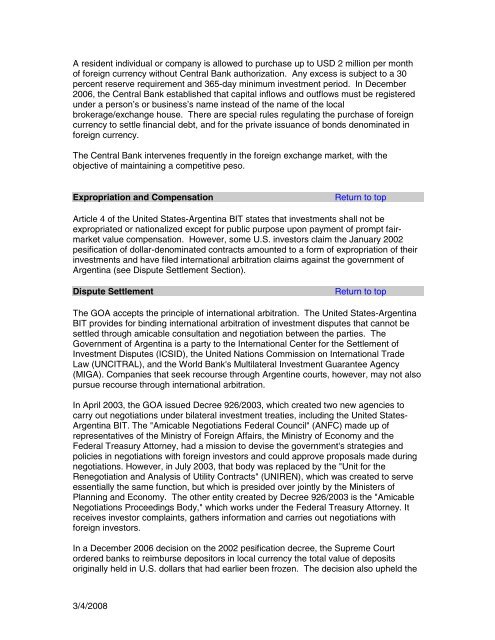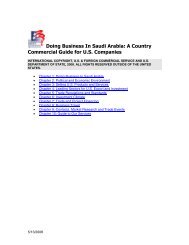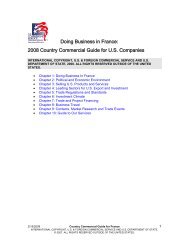Create successful ePaper yourself
Turn your PDF publications into a flip-book with our unique Google optimized e-Paper software.
A resident individual or company is allowed to purchase up to USD 2 million per month<br />
of foreign currency without Central Bank authorization. Any excess is subject to a 30<br />
percent reserve requirement and 365-day minimum investment period. <strong>In</strong> December<br />
2006, the Central Bank established that capital inflows and outflows must be registered<br />
under a person’s or business’s name instead of the name of the local<br />
brokerage/exchange house. There are special rules regulating the purchase of foreign<br />
currency to settle financial debt, and for the private issuance of bonds denominated in<br />
foreign currency.<br />
The Central Bank intervenes frequently in the foreign exchange market, with the<br />
objective of maintaining a competitive peso.<br />
Expropriation and Compensation Return to top<br />
Article 4 of the United States-<strong>Argentina</strong> BIT states that investments shall not be<br />
expropriated or nationalized except for public purpose upon payment of prompt fairmarket<br />
value compensation. However, some U.S. investors claim the January 2002<br />
pesification of dollar-denominated contracts amounted to a form of expropriation of their<br />
investments and have filed international arbitration claims against the government of<br />
<strong>Argentina</strong> (see Dispute Settlement Section).<br />
Dispute Settlement Return to top<br />
The GOA accepts the principle of international arbitration. The United States-<strong>Argentina</strong><br />
BIT provides for binding international arbitration of investment disputes that cannot be<br />
settled through amicable consultation and negotiation between the parties. The<br />
Government of <strong>Argentina</strong> is a party to the <strong>In</strong>ternational Center for the Settlement of<br />
<strong>In</strong>vestment Disputes (ICSID), the United Nations Commission on <strong>In</strong>ternational Trade<br />
Law (UNCITRAL), and the World Bank's Multilateral <strong>In</strong>vestment Guarantee Agency<br />
(MIGA). Companies that seek recourse through Argentine courts, however, may not also<br />
pursue recourse through international arbitration.<br />
<strong>In</strong> April 2003, the GOA issued Decree 926/2003, which created two new agencies to<br />
carry out negotiations under bilateral investment treaties, including the United States-<br />
<strong>Argentina</strong> BIT. The "Amicable Negotiations Federal Council" (ANFC) made up of<br />
representatives of the Ministry of Foreign Affairs, the Ministry of Economy and the<br />
Federal Treasury Attorney, had a mission to devise the government's strategies and<br />
policies in negotiations with foreign investors and could approve proposals made during<br />
negotiations. However, in July 2003, that body was replaced by the "Unit for the<br />
Renegotiation and Analysis of Utility Contracts" (UNIREN), which was created to serve<br />
essentially the same function, but which is presided over jointly by the Ministers of<br />
Planning and Economy. The other entity created by Decree 926/2003 is the "Amicable<br />
Negotiations Proceedings Body," which works under the Federal Treasury Attorney. It<br />
receives investor complaints, gathers information and carries out negotiations with<br />
foreign investors.<br />
<strong>In</strong> a December 2006 decision on the 2002 pesification decree, the Supreme Court<br />
ordered banks to reimburse depositors in local currency the total value of deposits<br />
originally held in U.S. dollars that had earlier been frozen. The decision also upheld the<br />
3/4/2008












